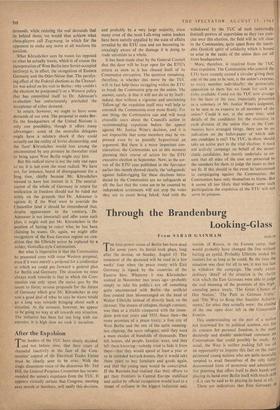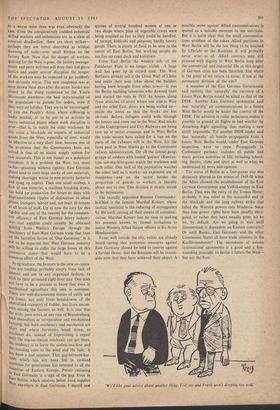Through the Brandenburg Looking-Glass
From SARAH CAINHAM Bunn.'
HE four-power status of Berlin has been dead .i. for sonic years. Its burial took place, long after the demise, on Sunday, August 13. The testament of the deceased will be read in'a few weeks' time when the peace treaty with East Germany is signed by the countries of the Eastern bloc. Whatever it was Khrushchev wanted in November two years ago—probably simply to take his public's eye off something quite unconnected with Berlin--the artificial fuss created then boomeranged on the head of Walter Ulbricht instead of directly back on the thrower. The stream of refugees, though constant, was then at a trickle compared with the imme- diate post-war years and 1953. Since then—the more promises of a peace treaty, a free city of West Berlin and the rest of the quite meaning- less claptrap, the more refugees; until they were a mass exodus of hundreds of thousands. They left homes, old people, familiar ways, and they left them knowing—nobody tried to hide it from them—that they would spend at least a year or so in crowded barrack-homes, that it would take them years to buy furniture and goods again, and that the young men would be conscripted. If the Russians had realised that their efforts to get their frontiers in Central Europe stabilised and sealed by official recognition would lead to a threat of collapse in the biggest industrial unit, outside of Russia, in the Eastern camp, they would probably have changed the line without batting an eyelid. Probably Ulbricht misled his masters for as long as he could. By the time the situation was clear for all to see, it was too late to withdraw the campaign. The really extra- ordinary 'detail' of the situation is the clarity with which the East Germans were able to judge the real meaning of the promises of this high- sounding peace treaty, 'The Great Chance. of Our Nation,' The Path to German Unity.' and The Way to Keep Our Socialist Achieve- ments,' for what they actually were: the closing of the one open door left in the Communist frontier.
This understanding on the part of a nation not renowned for its political acumen, nor for its concern for personal freedom, is the most decisively and doubly underlined comment on Communism that could possibly be made. As usual, the West is neither making full use of an opportunity to impress this fact on the inex- perienced young nations who arc quite naturallY tempted to avail themselves of the only fully- documented form of economic and administra- tive planning that offers itself to their hands nor playing its hand over Berlin itself with much skill -11.4 can be said to be playing its hand at all.
There are indications that East Germany to in a worse mess than was even obviously the case. Even the comparatively coddled industrial skilled workers and technicians are in a state of constant disaffection; there are short strike's— perhaps they are better described as wildcat downing of tools—over small hitches on the factory floor. Now that the danger of workers quitting for the West is gone, the factory manage- ments and party activists will drop their kid-glove tactics and under severer discipline the temper of the workers may be expected to get suddenly and seriously worse. This new toughness was at once shown three days after the sector border was closed in the sharp command to the Youth Movement members—the best indoctrinated of the population—to parade for orders, even if they were on holiday. They are to be 'encouraged' to join the People's Army where stiffening is badly needed; or to be put in as activists in heavy industrial plants where work discipline is Poor—that is, to watch the older workmen. In this crisis a blockade on exports of industrial goods from the West, especially of steel, would be effective in a very short time, because one of the problems that the Communists have not solved is that of an elastic supply system for raw materials. This is not meant as a polemical comment; it is a problem the West, too, must tackle—planning without rigidity. East German Plants tend to store huge stocks of raw materials, making shortages worse in non-priority factories and ,tying up capital. Then one small mishap, a lack of one material, a machine breaking down, can hold up production for hours or days with disproportionate ripples of dislocation in allied Plants, transport, labour and, not least, ill-temper at all levels of staff. Up to now the cure for this rigidity and one of the reasons for the compara- tive efficiency of East German heavy industry was that supplies could usually be obtained quickly from Western Europe through the machinery of East-West German trade that lives on the lucrative fiction of 'One Germany.' It is not to be expected that West German industry Will be willing to suffer the large losses of this commerce alone—that would have to be a common effort of the West.
ln agriculture, the farmers in the new co-opera- tives are tending, probably simply from lack of interest and not in any organised fashion, to Stick to their promised eight-hour day. One does not have to be a peasant to know that even in mechanised agriculture this idea is nonsense. There are well-documented stories of cattle and Pig losses, not only from breakdowns of the centralised transport of fodder, but from uncon- cern among the farmers as well. It is true that ,the wide, poor areas, at any rate of Brandenburg, lend themselves to co-operative and mechanised farming; but both machinery and mechanics are short and where harvesters break down, as Machines do, instead of improvising a repair ,nntil the tractor-station mechanic can get there, (11 tendency is to leave the useless machine and ,the standing corn to the wind and the rain: it has been a bad summer. That gap-between-har- vests which has not been felt in civilised countries for generations has returned to all the Countries of Eastern Europe. Potato rationing 1,,ri East Germany is a sign of the gap. Even in East Berlin, which receives better food supplies man anywhere in East Germany, I myself saw queues of several hundred women at one or two shops where piles of vegetable crates were being emptied as fast as they could be handled, of turnips, kohlrabi and potatoes; hardly luxury goods. There is plenty of food to be seen in the centre of East Berlin; but working people do not live on roast duck and tomatoes.
From East Berlin the western side of the Potsdamer Platz is no longer visible. A huge wall has gone up in record time. The West Berliners already call it the Great Wall of China and make their sour jokes about the builders having been brought from other towns—it was the Berlin building labourers who downed tools and started the riots in 1953. In houses along those stretches of street where one side is West and the other East, doors are being walled up— inside the doors so that the bricks -are less obvious. Before, refugees could walk through the houses and come out in the West. Rail tracks of the Underground and City Railways are being torn up at sector crossings and in West Berlin the trade unions have called for a ban on the parts of the railways still in the West, for the fares paid in West Marks go to the Communist railway administration. On all the labour-gangs groups of soldiers with loaded 'guitars' (Russian- type sub-machine-guns) watch the workmen and each other. One half of the population watches the other half as it works—an expensive use of manpower—and on the sector border the proportion of guards to workers is literally about one to one. This division is clearly meant to be permanent.
The recently appointed Russian Commander- in-Chief is the famous Marshal Koniev, whose tactical speciality is the reducing of strongpoints by the swift cutting of their means of communi- cation. Marshal Koniev lost no time in making his presence known by formal invitations to senior Western Allied liaison officers at his Army Headquarters.
From well outside the city, voices are already heard saying that economic measures against East Germany should be held in reserve against a further threat; that the Russians will be reason- able now that they have achieved their object. A possible move against Allied communications is quoted as a suitable moment to use sanctions. But it is quite clear that the small communica- tions problem of the token Allied garrisons in West Berlin will be the last thing to be touched by Ulbricht or the Russians. It will probably never arise at all. Allied convoys may still proceed with dignity to West Berlin long after the commercial and industrial life of this largest of German cities has been throttled. Just where is the point of no return to come, if not at the permanent division of the city?
A member of the East German Government said recently that 'naturally' the currency of a future West Berlin would be allied to that of the DDR. Another East German spokesman said that 'naturally' air communications to a future West Berlin would be under the control of the DDR. The advance in radar techniques makes it possible to ground all flights in bad weather by disturbing flight signalling, thus making a new airlift impossible. Yet another DDR leader said that 'naturally' all hostile propaganda from a future West Berlin would, under East German inspection, have to cease. Propaganda in Communist parlance includes all public and many private activities of life, including school- ing, theatre, clubs and sport as well as what we understand by news and opinion.
The status of Berlin as a four-power city was decisively altered in the winter of 1949-50 when the Allies allowed the establishment of the East German Government and Volkskammer in East Berlin. That was the entry of the Trojan Horse; probably it was relief at the successful end of the blockade and the long railway strike that lulled the Western powers into blindness. Since then four-power rights have been steadily abro- gated, or rather they have steadily gone, bit by bit, by default. Are we going to wait until Siemensstadt is dependent on Eastern contracts? Or until Russia, East Germany and the other Communist States all have trade missions in the Kurfurstendamm? The sacredness of solemn international agreements is a good and a fine- sounding principle. In Berlin it fetters the West— but not the East.
'We'd like your advice about another thing, Ted; me and Frank aren't sleeping too wen.'































 Previous page
Previous page